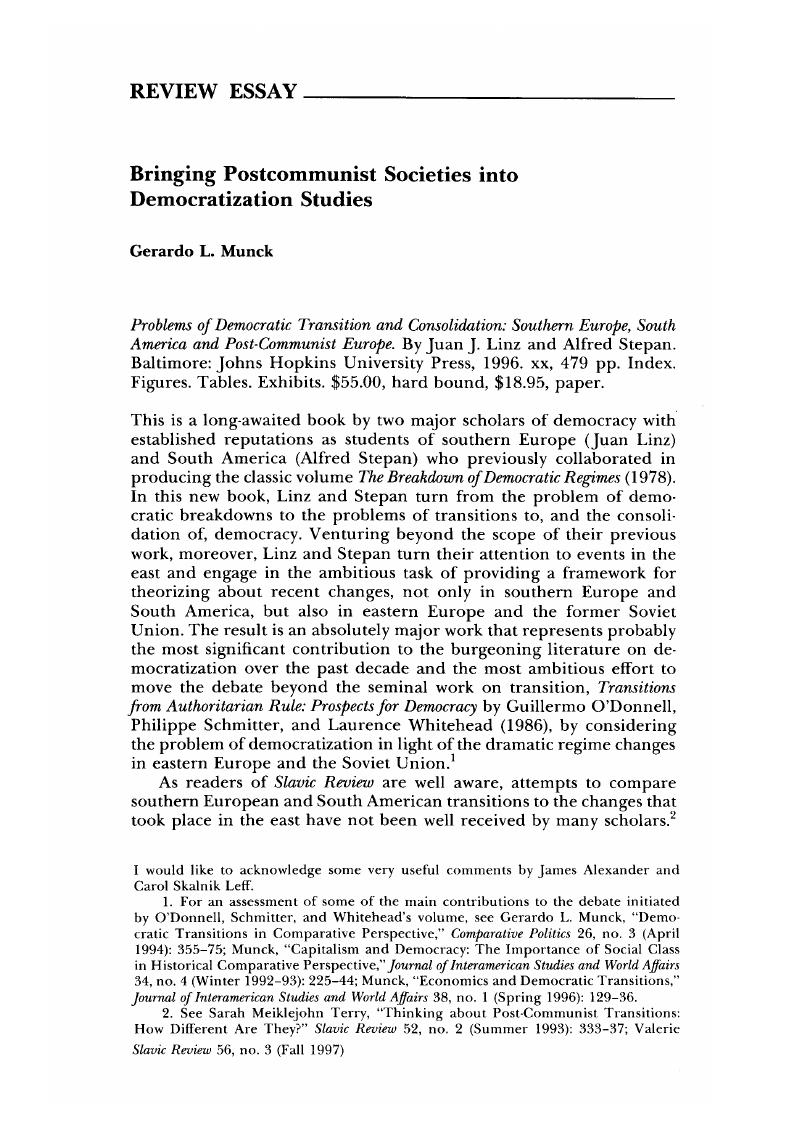Published online by Cambridge University Press: 27 January 2017

I would like to acknowledge some very useful comments by James Alexander and Carol Skalnik Leff.
1 For an assessment of some of the main contributions to the debate initiated by O'Donnell, Schmitter, and Whitehead’s volume, see Munck, Gerardo L., “Democratic Transitions in Comparative Perspective,” Comparative Politics 26, no. 3 (April 1994): 355–75;CrossRefGoogle Scholar Munck, , “Capitalism and Democracy: The Importance of Social Class in Historical Comparative Perspective,” Journal of Interamerican Studies and World Affairs 34, no. 4 (Winter 1992–93): 225–44;CrossRefGoogle Scholar Munck, , “Economics and Democratic Transitions,“ Journal of Interamerican Studies and World Affairs 38, no. 1 (Spring 1996): 129–36.CrossRefGoogle Scholar
2 See Terry, Sarah Meiklejohn, “Thinking about Post-Communist Transitions: How Different Are They?” Slavic Review 52, no. 2 (Summer 1993): 333–37;CrossRefGoogle Scholar Bunce, Valerie, “Should Transitologists Be Grounded?” Slavic Review 54, no. 1 (Spring 1995): 111–25;CrossRefGoogle Scholar Bunce, , “Paper Curtains and Paper Tigers,” Slavic Review 54, no. 4 (Winter 1995): 979–87.CrossRefGoogle Scholar
3 Schmitter, Philippe C. with Karl, Terry Lynn, “The Conceptual Travels of Transitologists and Consolidologists: How Far to the East Should They Attempt to Go?“ Slavic Review 53, no. 1 (Spring 1994): 173–85;CrossRefGoogle Scholar Karl, and Schmitter, , “From an Iron Curtain to a Paper Curtain: Grounding Transitologists or Students of Postcommunism?“ Slavic Review 54, no. 4 (Winter 1995): 965–78.CrossRefGoogle Scholar
4 Other scholars have also sought to remedy an acknowledged gap in the literature and to theorize about the linkage between the state and democracy. The problem of territorial integrity, the main issue stressed by Linz and Stepan, is discussed in Przeworski, Adam et al., Sustainable Democracy (New York, 1995),CrossRefGoogle Scholar chap. 1. Other angles on the problem of the state are highlighted by O'Donnell, Guillermo, “On the State, Democratization and Some Conceptual Problems (A Latin American View with Glances at Some Post-Communist Countries),” World Development 21, no. 8 (August 1993): 1355–70;CrossRefGoogle Scholar and by Pereira, Luiz Carlos Bresser, Maravall, José María, and Przeworski, Adam, Economic Reform in New Democracies (New York, 1993).Google Scholar
5 See, especially, Linz, Juan J., “Totalitarianism and Authoritarian Regimes,” in Greenstein, Fred and Polsby, Nelson, eds., Handbook of Political Science, vol. 3, Macropolitical Theory (Reading, Mass., 1975), 175–411.Google Scholar
6 The authors make a great effort to operationalize their concepts of democratic transition and democratic consolidation, providing precise dates for the completion of both tasks in the southern European and South American cases. In the postcommunist cases, however, they are less precise. They would seem to suggest that democratic transitions were not completed in Romania, in Russia (in this case, however, the analysis only covers events through October 1993), or, somewhat contradictorily, even in Estonia and Latvia.
7 The authors actually complicate matters even more by offering yet a third definition of democracy based upon the four-dimensional concept of political regime that is used to develop their typology of prior regimes.